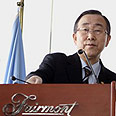
Ban urges Arabs to back Abbas in Gaza crisis
Arab League leaders meeting at Kuwait economic summit voice opinions on recent Israel-Hamas conflict. UN chief says Arab unity is crucial, Egypt's Mubarak questions efficiency of violent struggle against Israel, while Syrian president proposes renaming Jewish state 'the terrorist entity'
The situation in Gaza was the main topic discussed at the Arab economic summit held in Kuwait on Monday. UN Secretary-General Ban Ki-moon urged Arab leaders to join together in backing Palestinian President Mahmoud Abbas in his efforts to reunite the war-ravaged Gaza Strip with the West Bank.
Speaking a day after Israel and Hamas announced separate ceasefires, Ban also said that Arab unity was crucial if the three-week Gaza conflict was not to be repeated in the future.
"The Palestinians themselves must face the challenge of reconciliation, and work to achieve a unified government under the leadership of President Abbas," Ban told the Arab League summit expected to approve $2 billion in aid to rebuild Gaza.
"I call on all Arab leaders to unite and support this endeavour. We cannot rebuild Gaza without Palestinian unity."
Hamas militants wrested control of the Gaza Strip from Abbas's Palestinian Authority in 2007. Abbas, who still controls the West Bank, is seen as weak and ineffectual by leaders of some Arab countries like Syria.
Ban has been touring the Middle East for a week urging Israeli leaders and Arab governments to do everything in their power to end the fighting in Gaza and prevent the humanitarian crisis for the enclave's 1.5 million people from worsening.
He told reporters during the flight to Kuwait that if Arab states remain divided on Abbas and Palestinian unity, there was "no guarantee this (the Gaza conflict) will not happen again."
In his speech in Kuwait, Ban reiterated that Israel must reopen border crossings with Gaza, allow humanitarian aid in and withdraw from the Gaza Strip. Likewise, he urged Hamas to stop firing rockets at southern Israel.
But a permanent solution, he said, would require a return to the stalled Middle East peace process.
"A true end to violence, and lasting security for both Palestinians and Israelis, will only come through a just and comprehensive settlement to the Arab-Israeli conflict," he said. "The (Israeli) occupation that began in 1967 must end."
Mubarak: Resistance must be responsible
The Gaza conflict has divided Arab countries, as recent meetings of Gulf states have shown.
Among the speakers, was Egyptian President Hosni Mubarak, who questioned the efficiency of the violent struggle against Israel.
"We support the right to resistance, but feel it should be responsible," Mubarak said. "We believe that resistance, like the decision to start a war, should be responsible, and should be subject to profit and loss calculations."
The president continued to say, "There are factions that admit the balance of power leans very much in Israel's favor, and it will take many years to reach a balance of power. Should the Palestinian people wait that long?"
Syrian President Bashar Assad had much harsher words against Israel in his speech, saying, "What happened in Gaza is a crime, the likes of which has never been seen before. We must support the Palestinian resistance every change we get.
"I propose those present agree to call the Zionist entity 'the terrorist entity', especially after what happened. I hope this summit brings support of the resistance that will enable them to restore all their legitimate rights." Assad's speech was met with feeble applause.
Arab League Secretary-General Amr Moussa also offered his comments on Israel's recent offensive in Gaza, and expressed his support of the diplomatic steps some Arab countries took against the Jewish State.
"Closing the Israeli representative in Doha and closing the Mauritanian embassy in Israel are steps that should not only be admired, but supported," he said.










